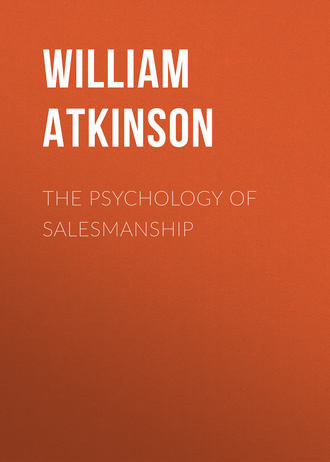 полная версия
полная версияThe Psychology of Salesmanship
The Selfish Faculties. This group of faculties includes Vitativeness, or Love of Life; Combativeness, or Love of Opposing; Destructiveness, or Love of Breaking Through; Alimentiveness, or Love of Appetite; Bibativeness, or Love of Drink; Acquisitiveness, or Love of Gain; Secretiveness, or Cunning; Cautiousness, or Prudence; Approbativeness, or Love of Praise; Self Esteem, or Self Reliance. Phrenology teaches that this group of organs occupy the sides of the back part of the head. Vitativeness, or Love of Life, when highly developed causes one to manifest a determination to live, and a great fear of death. Anything promising increased health or long life will greatly attract these people, and anything arousing a fear of ill health or death will influence them greatly. These people are excellent customers for health appliances, books on health, etc. Combativeness, or Love of Opposing, when highly developed causes one to desire a "scrap" or an argument or debate. These people can best be handled by seemingly allowing them to win in argument, and then leading them to suggest the thing that the Salesman has had in his mind all the time. These people may be led, or coaxed, but never driven. With them it is always a case of "sugar catches more flies than vinegar," or of the hot sun causing the man to drop the cloak which the fierce north wind was unable to blow away from him. A man of this kind will be so pleased at beating another in an argument on a minor point, that he will forget the main point and will be in a humor to be persuaded. Always avoid a direct argument or dispute with these people on important points – they will let their pride of combat obscure their judgment. But they will be ready to bestow favors on those whom they believe they have worsted in argument. Destructiveness, or Love of Breaking Through, when highly developed causes one to take great pleasure in doing things in new ways; in breaking precedents and defying authority, and in breaking down obstacles. If you can arouse this spirit in such a man, by showing him how he may do these things with your goods, he will fall in line. A man of this kind may be interested at once in any proposition whereby he may be enabled to do something in a novel way here – to defy opposition or established custom – or to break down opposing obstacles. The keynote of this faculty is: "Make Way." Alimentiveness, or Love of Appetite, when highly developed causes one to incline toward gluttony and gormandizing, and to place undue importance upon the pleasures of the table. A man of this kind "lives to eat" instead of "eating to live," and may be reached through his weakest point – his stomach. To such a man a good dinner is more convincing than a logical argument. Bibativeness, or Love of Drink, when highly developed causes one to manifest an inordinate taste for liquids of all kinds. In some cases, where alcoholic drinks are avoided by such people, they will run to excess in the direction of "soft drinks" such as ginger ale, soda water, etc. It does not follow that these people are fond of the effects of alcohol, the craving seemingly being for liquids in some form. Such people, if their appetites are not controlled, will let their taste for drinks run away with their judgment and reason.
Acquisitiveness, or Love of Gain, when highly developed causes one to be very grasping, avaricious, and often miserly. But, when not so highly developed, it causes one to manifest a keen trading instinct, and is a necessary factor in the mental make-up of the successful merchant. Those in whom it is highly developed will be interested in any proposition which seems to them to promise gain or saving. In selling such a man, the effort should be to keep the one point of profit or saving always in evidence. In some cases this faculty, too highly developed and not counterbalanced by other faculties, will make a man "penny wise and pound-foolish," and will focus his mental gaze so closely on the nickel held close to his eye that he will not see the dollar a little further off. The "money talk" is the only one that will appeal to these people.
Secretiveness, or Cunning, when highly developed causes one to incline toward double-dealing, duplicity, trickery and deception. It is the "foxy" faculty, which, while useful to a certain degree, becomes undesirable when carried to excess. In dealing with a man of this kind, be on guard so far as accepting his statements at full value is concerned. Accept his statements "with a grain of salt." Those who wish to "fight the devil with his own fire" can reach these people by allowing them to think that they are overreaching or getting the best of the Salesman. The Salesman who is apparently defeated by these people, is very apt to have discounted their methods in advance, and has mapped out his line of retreat in advance so that the defeat is really a victory. These people often will sacrifice a real advantage concerning a big thing for the sake of tricking one out of a small advantage. To trick another causes them to feel a glow of righteous well-being and self-satisfaction, and makes them forget the main point in the deal. A small victory thus won acts on them like the good dinner to the Alimentive man, or flattery to the Approbative person. A faculty developed to excess is always a weak point which can be used by others who understand it.
Cautiousness, or Prudence, while an admirable quality when normally developed, becomes, when highly developed, an undesirable quality. When highly developed it causes one to be over-anxious, fearful, afraid to act, liable to panic, etc. These people must be cultivated carefully, and led to acquire confidence and trust. One should be very careful in dealing with these people not to cause suspicion or alarm. They should be treated with the utmost fairness, and given full explanations of matters of which they are in doubt. As a rule they are very slow in giving confidence, but when they once place confidence in a person they are very apt to stick to him. Their very fearfulness acts to prevent their making changes when confidence is once secured. These people cannot be "rushed," as a rule – they require time in order to gain confidence. They are, however, subject to an occasional "rush" by reason of their panicky disposition, if they can be made to fear that if they do not act some competitor will be given the chance, or that prices will advance if they do not order at once. These people must be handled carefully, and the Salesman who masters their nature will be well repaid for his trouble and pains.
Approbativeness, or Love of Praise, when highly developed causes one to be susceptible to flattery, desirous of praise, fond of "showing off" and displaying himself, vain, sensitive to criticism, and generally egotistical and often pompous. This quality when highly developed is a weakness and gives to an adversary a powerful lever to work. The Salesman, while secretly detesting this quality in a buyer, nevertheless finds it a very easy channel of approach and weapon of success, when he once understands its characteristics. These people can be reached by an apparent "falling in" with their opinion of themselves, and a manifestation of the proper respect in manner and words. These are the people to whom the "soft soap" is applied liberally, and who are carried away by an apparent appreciation of their own excellence. They will be willing to bestow all sorts of favors upon those who are sufficiently able to "understand" them, and to perceive the existence of those superlative qualities which the cruel, cold, unfeeling world has ignored. These are the people for whom the word "jolly" was invented, and who are ready to absorb the available world-supply of that article.
Self Esteem, or Self Reliance, is a very different quality from that just described, although many people seem unable to make the distinction. Self Esteem when highly developed causes one to appreciate one's powers and qualities, while not blinding oneself to one's faults. It gives a sense of self-help, self-respect, self-reliance, dignity, complacency, and independence. Carried to an extreme it manifests as hauteur, superciliousness, imperiousness and tyranny. It is a characteristic of the majority of successful men who have made their own way by their own efforts. These people insist upon having their own way, and using their own minds – they resent apparent influence or suggestions, and often deliberately turn down a proposition simply because they think that an effort is being made to force them into it. The best way to deal with these people is to frankly acknowledge their right to think for themselves, both in your manner, tone and actions – and to present the proposition to them in an impersonal way, apparently leaving the whole matter to their own good judgment. A logical appeal appeals to them providing you do not make the mistake of pitting yourself against them as an opponent in argument. You may play the part of the lawyer to them, but remember always they want to play the part of judge, and not that of the opposing counsel. If a matter be subtly suggested to them in such a way as to make them think that they have thought it themselves, they will favor it. Always give them a chance to think out the point themselves – they like it. One need not cringe to or flatter these people. All that is necessary is to maintain your own self-respect, but at the same time let them walk a little ahead of you, or stand just a little bit higher – that is all they need to make them feel comfortable. They much prefer being a little higher or ahead of a strong man than a weakling – it is more complimentary to them. They appreciate the one who forces them to use their heaviest guns – but who finally allows them to claim the victory.
CHAPTER V
THE MIND OF THE BUYER (CONTINUED)
The Faculties of Application. This group consists of two qualities: that of Firmness, or Decision; and that of Continuity, or Patience. These faculties, together with Self-Esteem, are located at the upper-back, or back-upper, part of the head.
Firmness, or Decision, when highly developed causes one to manifest stability, tenacity, fixedness of purpose, often reaching the point of obstinacy, mulishness and stubbornness. These people cannot be driven, or forced into anything. They are "mighty set" in their ways, and when they once take a position are very apt to stick to it "right or wrong." They are apt to fight to the last ditch for what they consider principle, and will hold on to the end in what they believe to be right. To attempt to drive them by force is to dash one's head against a stone wall. The only way to handle these people is to endeavor to get them interested in your side of the case before they have "set" their minds and made up their opinion. If they have already been prejudiced against your case, the only way is to give up the fight from the front, and endeavor to present the matter from a different viewpoint, or angle, so that new points will be presented which take the matter out of the old category. These people will never give in unless they can say: "Oh, that of course alters the matter entirely;" or "Oh, well, that places it in a new light;" or "That is an entirely different proposition," etc. Leave them victors of the positions upon which they are "set," and endeavor to enlist their interest upon some new aspects, points, or principles – you have at least an even chance of winning on the new point, whereas you have none whatever on the old one. If, however, you can fit your case to some of their established prejudices, for or against, you have won your battle, for their quality of stability will then be employed in your favor instead of against it. You will have to fit your case to their moulds – cut your garment according to their pattern. A stubborn and balky horse or mule can often be started in motion by turning its attention to a new thing – such as putting a piece of twisted paper in its ear, adjusting its harness in a new way, etc. The same principle will work on stubborn men, "set" in their ways. Get their mind off the point in question, and they will be rational. Let them have their own way about their own points – and then plan a flank or rear attack on them. You cannot batter down their stone-wall – you must either soar over it, tunnel under it, or else go around it.
Continuity, or Patience, when highly developed causes one to "stick to" a thing once undertaken; to manifest patience and perseverance, and to give up the mind to one thing to the exclusion of others. It is difficult to interest these people in new things – they instinctively distrust the new idea or thing, and cling to the old. These people are very conservative and dislike change. They can be dealt with best by avoiding shocking them with entirely new things, and by carefully attaching the newer idea or thing to the old so that it seems a part of the latter. New things under old names do not disturb these people as much as old things under new names – it is the form and name, rather than the substance with them. Old wine in new bottles they abhor – but new wine in old bottles they will stand. Arguments based on "old established" things, or "good old-time" things, appeal to them. Things must be "respectable," "well-established," "standing the test of years," "no new-fangled notion," etc., to appeal to them. Beware of trying new and startling changes on them – they will be prejudiced against you at once. Fall in with their ideals, and they will be excellent friends and steady customers. The words "conservative" and "established" sound well to their ears. On the contrary, people in whom this faculty is deficient will incline toward new things because they are new. This faculty, either in excess or when deficient, strongly affects the judgment, and must be taken into consideration by the Salesman.
The Religio-Moral Faculties. This group of faculties includes Conscientiousness, or Moral Principle; Hope, or Optimism; Spirituality, or other-worldliness; Veneration, or Reverence; and Benevolence, or Human Kindness. The organs manifesting these qualities are located in the front-top of the head.
Conscientiousness, or Moral Principle, when highly developed gives one a high sense of right, justice, truth, virtue, and duty. In dealing with these people be particularly careful to make no misstatements, misrepresentations, and exaggerations, but to adhere closely to the facts of the case. Avoid also any appearance of trickiness or sharp practice, stories of shrewd bargains, etc. These people become staunch, firm friends if dealt with as they deserve, but become prejudiced against people and houses whom they suspect of unfair dealings, or in whom they lose confidence. Their keynote is "right's right" – and you should adhere to it in all dealings with them. They are "the salt of the earth," and it is a pity that there are not more of them. It is true that sometimes this faculty seems to become perverted into phariseeism and hypocrisy – but, then, every good thing has its counterfeit, and the thing to do is to distinguish between the true and the false, here as elsewhere.
Hope, or Optimism, when highly developed causes one to look on the bright side of things, expect favorable outcomes, look confidently forward, and expect much from the future. Its perversion manifests in visionary dreams and castle-building. These people are amenable to appeals to future success, bright prospects, cheerful outlook, and new undertakings which seem promising. They become enthusiastic when propositions are properly presented to them, and prefer to deal with Salesmen of similar mental characteristics. These people are natural "bulls" in business – beware of posing as a "bear" when dealing with them. They relish a good cheering, cheerful talk more than anything else. They are good people to deal with, particularly if the quality in question is balanced by caution and trained by experience.
Spirituality, or Other-worldliness, when highly developed tends to cause one to live on mental heights above the things of ordinary material existence; to trust to the "inner light;" to incline toward mysticism; and to experience a religious consciousness above the ordinary. When manifested in a lesser degree it is evidenced by the ordinary "religious" feeling. Perverted, it manifests as superstition, credulity and "psychism." The people in whom this faculty is active seem to feel that business is a degrading necessity, and they are never thoroughly at home in it, unless the goods handled happen to be along the lines of their general inclination, as for instance, religious books, etc. Consequently, their business traits and tastes arise from the other faculties, rather than from this particular one. However, they are easily prejudiced against one whom they imagine does not agree with them in their beliefs and convictions, and are apt to be swayed rather more by feeling, emotion and sentiment than by cool judgment and pure reason. They are usually strong in their likes and dislikes, and are susceptible to appeals to their imagination.
Veneration, or Reverence, when highly developed causes one to manifest reverence and extreme respect to authority of all kinds. These people are usually good church members and law abiding citizens. In business, the faculty is apt to cause them to place great stress upon authority and example. If some large merchant has ordered certain goods, they will be impressed by his example. They regard testimonials and recommendations highly. In dealing with them one must avoid speaking lightly of any thing or person esteemed by them, for they will be quick to resent it. They are usually decidedly conventional, and aim to meet the full requirements of "respectability" and social customs.
Benevolence, or Human Kindness, when highly developed causes one to manifest sympathy, kindness, generosity, and philanthropy. These people are altruistic and always ready to do another a good turn. They are moved by their feelings rather than by their reason and judgment, and will often base their business transactions rather more upon friendliness and personal feeling than upon cold business judgment and policy. They are generous where their sympathies and feelings are interested, and are too often taken advantage of by selfish people who play on their unselfish natures. Too often are they considered "easy," and are imposed on accordingly. The personal equation of the Salesman plays an important part in dealing with these people.
From these several groups of faculties arise many combinations of character in people. While it is true that there is almost infinite variety among people, nevertheless, it is true that there are a few general classes into which the majority of buyers may be fitted or grouped for convenience. Let us now consider some of the more common classes, and see how the faculties, in combination, manifest themselves.
The Argumentive Buyer. This man finds his greatest pleasure in arguing, combating and disputing with the Salesman – argument for the sake of argument, not for the sake of truth or advantage. This trait arises from developed Combativeness and Destructiveness. Do not take these people too seriously. Let them enjoy a victory over you on minor points, and then after yielding gracefully coax them along the main lines of the selling talk. At the best, they are arguing over terms, definitions, forms, etc. and not over facts. Let them make their own definitions, terms and forms – and then take their order for the goods which you have fitted into their side of the argument. If, however, the argument is based upon true reasoning and with a legitimate intent, then reason with him calmly and respectfully.
The Conceited Buyer. This fellow is full of Approbativeness. We have told you about him elsewhere. Meet him on his own plane, and give him the particular bait indicated for his species – he will rise to it. Appearing to defer to him, you may work in your arguments and selling talk without opposition. Prefacing your explanation with "As you know by your own experience;" or "as your own good judgment has decided;" etc., you may tell your story without much opposition. You must always let him feel that you realize that you are in the presence of a great man.
The "Stone Wall" Buyer. This man has Self Esteem and Firmness largely developed. We have told you about him under those two headings. You must fly over, tunnel under, or walk around his stone wall of reserve and stubbornness. Let him keep his wall intact – he likes it, and it would be a shame to deprive him of it. A little careful search will generally show that he has left his flanks, or his rear unguarded. He will not let you in the front door – so go around to the kitchen door, or the side-door of the sitting room – they are not so well guarded.
The Irritable Buyer. This is an unpleasant combination of Approbativeness and Combativeness, in connection with poor digestion and disordered nerves. Do not quarrel with him, and let his manner slide over you like water off a duck's back. Stick to your selling talk, and above everything keep cool, confident, and speak in even tones. This course will tend to bring him down. If you show that you are not afraid of him, and cannot be made angry – if your tones are firm yet under control and not loud – he will gradually come down to meet you. If you lose your own temper, you may as well walk out. Simply ignore his "grouch" – deny it out of existence, as our New Thought friends would say.
The "Rough Shod" Buyer. This man has large Destructiveness, and Self Esteem, and wants to run things himself. He will try to ride rough shod over you. Keep cool, even-tempered, self-possessed, and firm yet respectful. Do not let him "rattle" you. It is often more of a "bluff" than anything else. Keep on "sawing wood;" and do not be scared off. These people are often but "lath-and-plaster" instead of the iron and steel they appear to be at first sight. Keep firm and calm, is the keynote in dealing with them.
The Cautious Buyer. This man generally has Cautiousness and Continuity well developed, and Hope deficient. He is conservative and fearful. Avoid frightening him with ideas of "new" things or "experiments." If you are selling new things or ideas, manage to blend them in with things with which he is familiar – associate the new and unfamiliar with the old and familiar. And be conservative and careful in your talk, do not give him the idea that you are a radical or a "new fangled idea" man. To him, be an "old fashioned person."
The Cunning Buyer. This fellow has large Secretiveness or Cunning – he belongs to the fox tribe. He likes to scheme out things for himself, so if you will content yourself with giving him broad hints, accompanied by expressive glances, regarding what can be done with your goods, he will be apt to scheme out something in that direction, and thinking he has done it all himself, he will be pleased and interested. Let him know that you appreciate his shrewdness, particularly if he shows that his Approbativeness is well developed. But, if not, better let him think that he is deceiving you regarding his true nature. The majority of cunning people, however, take pride in it, and relish a little grim appreciation of their quality.
The Dignified Buyer. This man has large Self Esteem, and probably also large Approbativeness. In either case, let him play the part for which Nature has cast him, and you play yours. Your part is in recognizing and respecting his dignity, by your manner and tone. Whether the dignity be real or assumed, a recognition of and falling in with it is appreciated and relished. Imagine that you are in the presence of your revered great-grandfather, or the bishop, and the rest will be easy. We once knew of a jovial, but indiscreet, salesman who lost a large sale to a buyer of this kind, by poking him in the ribs and calling him "old chap." The buyer barely escaped an attack of apoplexy – the Salesman entirely escaped a sale.
The "Mean" Buyer. This man is moved by Acquisitiveness. He is suspicious of you from the start, for he feels that you intend to get some money from him. Don't blame him – he's built that way. Instead, get his mind off the subject and on to another, by plunging in at once with the statement that you have something upon which he can make money, or something that will save him money. Emphasize these points, and you will have aroused his curiosity. Then proceed along the same lines – something to make money for him, or something to save money for him – these are the only two arguments he can assimilate.









